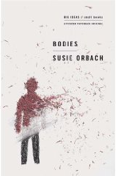
If you think that body image issues are confined to girls and women in Western society, think again. Susie Orbach, the author of the 1979 groundbreaking bestseller Fat is a Feminist Issue, shines a light on the true nature of our body image afflictions in her latest book Bodies – and it isn’t pretty.
Scandinavian women who believe they’re too tall can get their legs shortened by having a surgeon break the femur bones and cut them down to a desirable length. Chinese men and women wanting the opposite can have a four-inch metal rod implanted in their upper legs to add height. Approximately half of Korean girls today are westernizing their eyes. Men worldwide are signing up for phalloplasty procedures – to enlarge and lengthen their penis. Parents in the U.S. can even have their children’s images photoshopped so as to eliminate nasty imperfections. Pulling on findings and facts from various countries, Orbach insightfully shows us how body obsession has reached epidemic levels around the world. So much so that she argues, “the body is turning from being the means of production to the production itself.”
The experienced psychotherapist, co-founder of Dove’s Campaign for Real Beauty, and one of the originators of www.any-body.org skillfully dissects the numerous influences that drive the desire to alter our bodies. She adeptly pulls on multiple sources of research ranging from case studies from her own clinical practice to discoveries made in Colombia in the 1980s. What’s most exciting about Bodies is her presentation of fresh evidence from the field of neuropsychology suggesting that the brain is connected to body image. More specifically, Orbach cites a “built-in empathetic and mimicking capacity,” which allows us to learn at all stages of our lives, purely on an unconscious basis. It is not one’s DNA that passes mannerisms from parent to child, but rather this transfer occurs by simple watching. She makes a solid argument by proposing that children not only acquire particular gestures from their caregivers, but also the ways that the adults around them speak about and treat their own bodies.
She takes it another step further by linking this evidence with the media’s role in the ever-growing dissatisfaction with our bodies. Orbach slaps us with the reality that “a good 2,000 to 5,000 times a week, we receive images of bodies enhanced by digital manipulation.” Because we possess an inherent mechanism that drives us to imitate, the trailblazing psychotherapist convincingly asserts that we naturally can’t help but react to the bombardment of images we consume daily. This message is especially relevant for those who feel that they are unaffected by the pressure to conform to the Western body ideal. Despite awareness, intelligence, or choice, whether we like it or not, we are all impacted.
Orbach doesn’t mince words as she narrows in on Big Business, which she refers to as “the merchants of body hatred.” Her attack on the $100-billion diet industry is amply armed with hard-to-ignore facts. The most powerful truth she delivers hones in on the reality that diet companies would not be afloat today if it were not for their dependence “on a 95 percent recidivism rate.” Her spotlight on the cosmetics industry reveals that by targeting younger and younger girls, as well as men, companies like L’Oréal and Nivea are growing at 14 percent a year. Bodies opens our eyes to the $14-billion plastic surgery business. We buy into, not only the promises of youth and happiness, but also the message that to leave the body unchanged is perceived as “a sign of self-neglect.”
Despite the alarming facts, the book doesn’t generate desperation. Actually, Bodies scores high on the inspiration factor. After processing the various perspectives and evidence that Orbach craftily weaves together, the reader understands that we are not genetically programmed to suffer with body dissatisfaction and shame. Instead, she offers an alternative: By changing our environment, we can change our reactions to it. She gives us reason to believe that this growing epidemic can be halted. Future generations do not have to be afflicted with the misguided belief that their bodies are not good enough. You can’t help but trust in Orbach’s message that we can create a different reality for ourselves, one that involves viewing our bodies as a “place we live rather than an aspiration always needing to be achieved.” Well-written and extensively documented, Bodies is a much-needed positive step toward a healthier state of mind and body – for women and men everywhere.
Related Content:
Endangered Species: Challenging Body Beautiful Culture
3 thoughts on “A Second Round of Applause for the Book “Bodies””